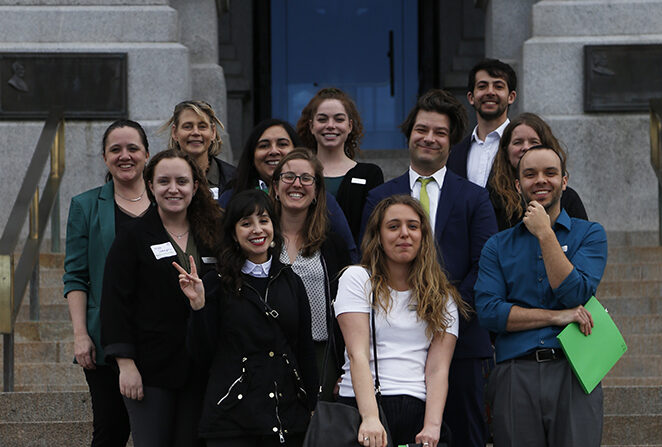In previous posts, we talked about how Hunger Free Colorado helps individuals and families find food and partner organizations fight hunger in their communities.
Today, we’ll talk about how we are changing systems to create long-term change through policy and advocacy.
Where do we even begin with policy?
For many people, policy is a confusing, daunting task done by others.
It’s easier to not even touch policy sometimes. But imagine for a second, your school cafeteria. What food was offered? How much time did you get to eat lunch? Was there support for kids who couldn’t afford meals? Many of our experiences with food and more are shaped by policies, directly or indirectly. Things don’t simply happen, and we can raise our voice to decide what happens.
Why is policy important to help end hunger?
Hunger Free Colorado’s programs to help people find food are critical to ensuring that people can take care of themselves and their families now.
Policy work takes that one step further to ensure that systems are in place so everyone can eat and not worry about where their next meal will come from.
Policy work is important because it creates and changes the laws/rules. And how those laws/rules are implemented are often the barriers to programs and resources. We work to ensure that communities impacted by policies have a say in how they are created and implemented, which has not been the case historically.
Policy can help end hunger because we can invest public resources (taxes) into programs that work to improve systems and the lives of our community members. The programs vary from strong nutrition programs that help people afford food, to programs that invest in our food systems to make them work better for all communities, including low-income communities.
Hunger Free Colorado’s Advocacy for Change (2021)
This year, we worked on three primary initiatives with the Colorado Legislature:
- Colorado Food Pantry Assistance Grant
The Colorado Food Pantry Assistance Grant Program helps food pantries and food banks purchase critical meat, dairy and fresh produce from local Colorado farmers and ranchers. It’s win-win legislation that helps people access food today AND supports local farmers, building the local economy to strengthen communities for the future.
SB21-027: Emergency Supplies for Colorado Babies and Families passed this session and will provide $5 million in continued funding for food pantries and food banks to purchase food, including from local farmers. The bill also created a state diaper bank grant program (the first of its kind), which will provide experienced diaper banks $4 million in funding over two years to distribute diapers to community organizations across the state, including food pantries and food banks.
- Supplemental Nutrition Assistance Program (SNAP) Outreach
We sought $1 million to fund Colorado’s SNAP outreach program, a portion of which the federal government will match. These funds help community-based organizations enroll eligible Colorado households in this vital nutrition program. The state budget passed and included this important investment that will support work across the state to help eligible Coloradans access the food benefits for which they qualify.
In addition to being matched by federal funding, these dollars will bring millions more to the state in the form of federal SNAP benefits that go directly to low-income Coloradans, supporting community health and wellbeing and helping our economy recover.
- Agricultural Worker’s Rights
Agricultural Worker’s Rights, led by the amazing Project Protect Food Systems, worked to make sure that each part of the food system was equitable, including for the people who grow our food. In the U.S., farmworkers are not guaranteed many basic rights and safeties that most of us take for granted. For example, they are not guaranteed minimum wage!
This bill ensures that farmworkers will get rights and protections they did not get before. We are thankful that this bill passed! It’s an important first step, and we will continue advocating for farmworker rights.
Read about all of our 2021 advocacy successes on our website!
What’s next?
Right now, we are advocating for Congress to take bold action to address poverty and hunger, especially among children, in the next federal recovery package. Join us in calling for Congress to ensure no child struggles to learn on an empty stomach here!
How can I help end hunger?
Ending hunger takes all of us. Although policy may seem daunting, we want to encourage YOU to take action and spark real change.
“People can have a role in policy making by working with others who are doing similar work, including advocacy organizations like Hunger Free Colorado,” said Hunger Free Colorado’s Director of Public Policy, Ashley Wheeland.
Now that you know what Hunger Free Colorado does, here are some actions you can take to help end hunger.
- Sign up to get updates!
This is the best way to know what our policy team is working on and when there are opportunities to take action on rules and laws that impact hunger. - Help support our work with a donation. Every $1 counts to help end hunger!
- Spread the word! Below are some example posts that you can copy/paste to your social media channels.
I signed up for Hunger Free Colorado’s action network because I want to help end hunger. I encourage you to sign up so you can stay updated on ways to advocate. Let’s end hunger together: HungerFreeColorado.org/get-involved/advocate/
When we work together, we can make big changes! Stay updated on ways you can advocate to end hunger in Colorado by signing up for Hunger Free Colorado’s action network: HungerFreeColorado.org/get-involved/advocate/

